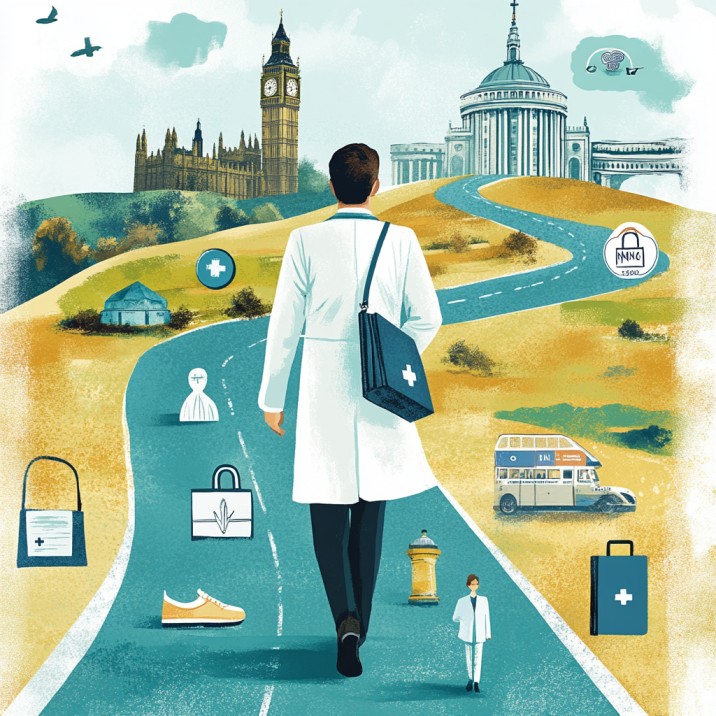The United Kingdom has always been a popular destination for Indian doctors seeking to broaden their horizons and advance their careers. With a robust healthcare system, advanced medical technology, and a multicultural environment, the UK offers numerous opportunities. However, the process of transitioning to practice in the UK can seem complex and daunting. This guide aims to simplify that journey, providing a clear roadmap for Indian doctors aspiring to practice medicine in the UK.
Understanding the Requirements
The first step for any Indian doctor wanting to practice in the UK is understanding the requirements set by the General Medical Council (GMC), the regulatory body for doctors in the UK. The main criteria include:
- Primary Medical Qualification: Your medical degree from a recognized Indian institution must be acceptable to the GMC.
- English Language Proficiency: You will need to demonstrate proficiency in the English language. The most commonly accepted test is the International English Language Testing System (IELTS). A minimum score of 7.5 overall, with at least 7.0 in each category, is typically required.
- PLAB Examination: The Professional and Linguistic Assessments Board (PLAB) test is a two-part exam that assesses your skills and knowledge as a doctor. Passing both parts is mandatory.
The PLAB Exam: A Closer Look
The PLAB exam is crucial for gaining GMC registration. It consists of:
- PLAB 1: A written exam that tests your medical knowledge. It covers common diseases seen in the UK, and the test is multiple-choice questions.
- PLAB 2: An Objective Structured Clinical Examination (OSCE). This practical exam assesses your clinical skills in simulated real-life scenarios.
Preparing for these exams requires dedicated study and practice. There are various resources available including online courses and study materials designed specifically for the PLAB.
GMC Registration: The Next Step
Once you have cleared your PLAB exams, you can apply for full GMC registration. This involves:
- Submitting Your Documents: Provide all necessary documents, including proof of identity, medical qualifications, and PLAB results.
- Verification: The GMC will verify the authenticity of your qualifications with your university or medical council.
- Payment of Fees: There are registration fees associated with becoming a fully registered doctor.
Visa and Immigration
After you have obtained GMC registration, the next step involves securing the necessary visa to live and work in the UK. For doctors, the most relevant visa is typically the Tier 2 (General) visa, which is also known as the skilled worker visa. This visa is linked to sponsorship by a UK employer. You will need a job offer before you can apply for this visa.
The Visa Application Process
- Certificate of Sponsorship (CoS): Your employer will provide a CoS, which is necessary for your visa application.
- Application: Once you have your CoS, you can apply for the Tier 2 (General) visa.
- Immigration Health Surcharge: You will need to pay an Immigration Health Surcharge as part of your application, giving you access to the UK’s National Health Service (NHS).
Finding Employment in the UK
Securing a job in the UK can be done through several channels:
- NHS Jobs Website: The official NHS Jobs website is a great place to start your job search.
- Recruitment Agencies: Several agencies specialize in recruiting doctors for the NHS.
- Networking: Attending medical conferences, job fairs, and connecting with other doctors can also be a great way to find opportunities.
Adapting to the UK Healthcare System
The UK healthcare system, primarily the National Health Service (NHS), operates differently from the Indian healthcare system. Understanding these differences is critical.
- Familiarise Yourself with NHS Guidelines: Learn about the clinical guidelines and protocols used in the UK.
- Attend Induction Programmes: Most hospitals offer induction programs for international medical graduates.
- Seek Mentorship: Find a mentor who can guide you through the initial phase.
Continuous Professional Development
Continuous learning and development are crucial in the medical field. The GMC requires doctors to demonstrate their commitment to professional development, known as revalidation.
- CPD Activities: Engage in activities such as attending conferences, workshops, and courses to maintain your professional skills.
- Portfolio: Maintain an up-to-date portfolio of your learning experiences.
Conclusion
The path for Indian doctors to practice medicine in the UK is challenging but achievable. With careful planning, dedicated preparation, and a clear understanding of the processes involved, you can realize your dream of a medical career in the UK. This journey involves navigating through GMC registration, visa applications, and adapting to a new healthcare system, but ultimately it offers a rewarding and enriching career experience.
Call to Action
To enhance your practical skills and gain a deeper understanding of specialized medical fields, consider exploring the Clinical Fellowship in Obstetrics and Gynaecology offered by OC Academy. This fellowship provides a comprehensive learning experience with hands-on training and expert guidance, preparing you for advanced practice and improving your overall clinical competence, making it a valuable addition to your credentials as you prepare for your medical career in the UK.

